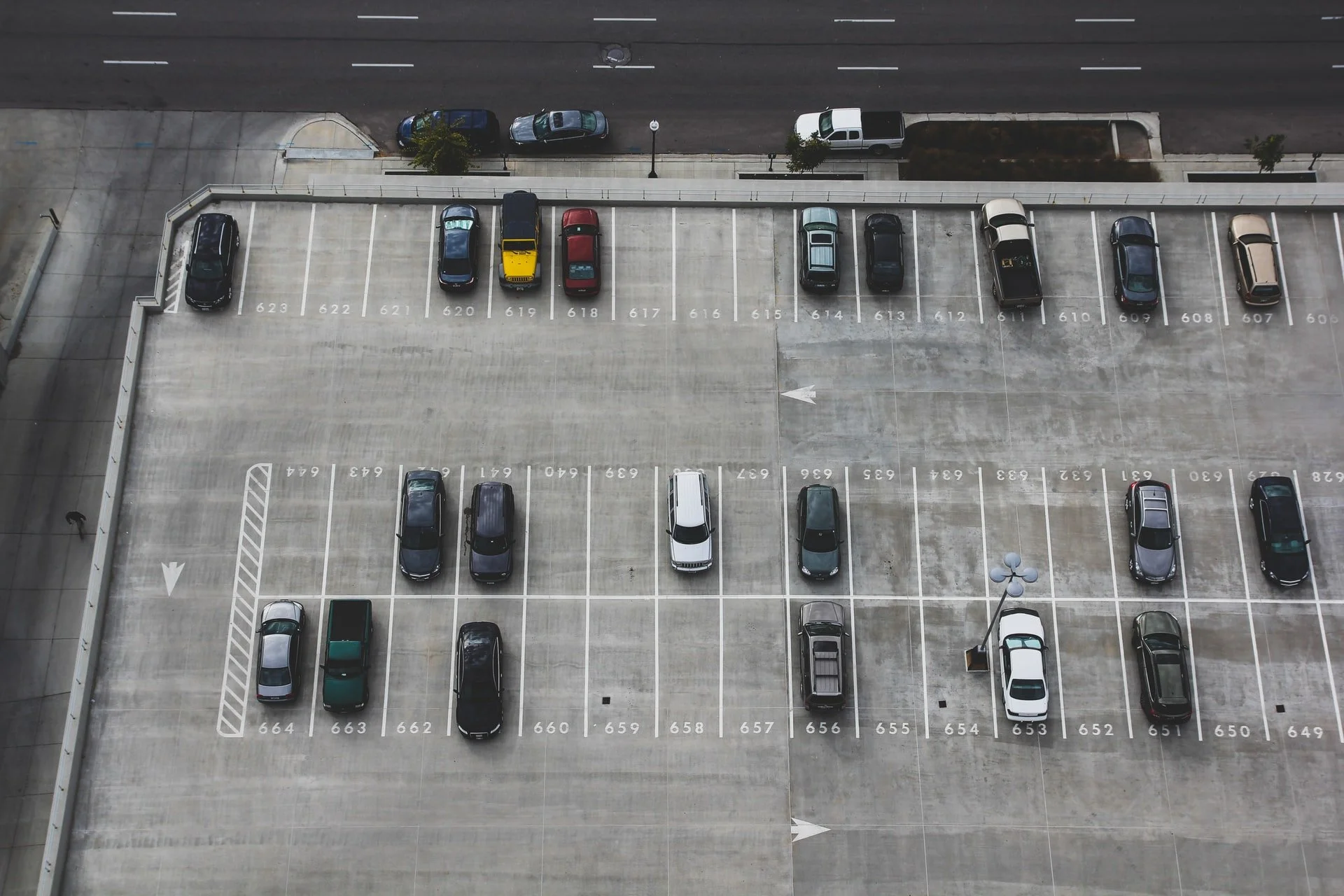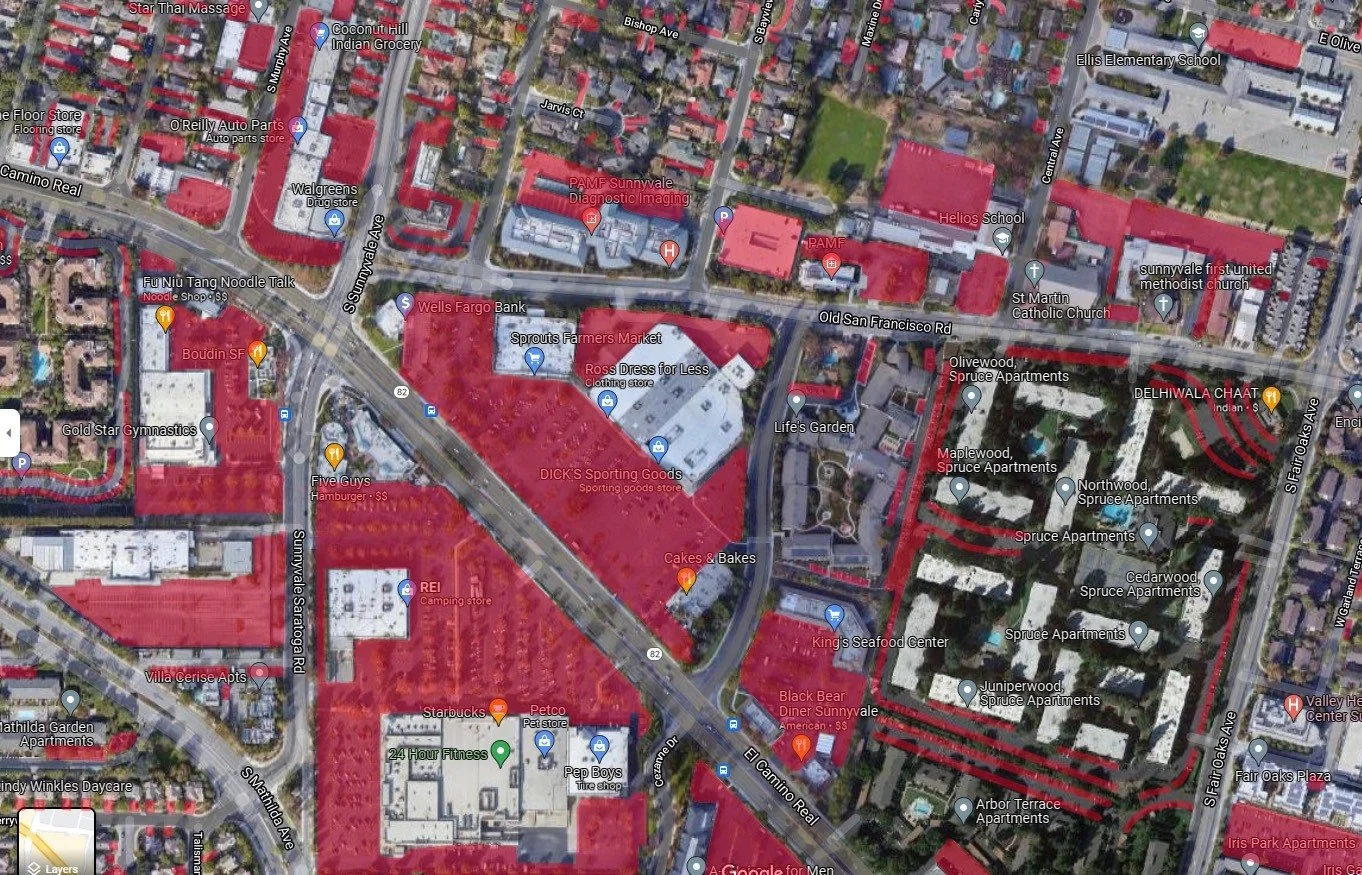"We Require WAY Too Much Parking"
(Source: Unsplash.)
Twenty-one-year-old Ari Feinsmith has had an interest in biking from a young age, but it wasn’t until he started his civil engineering degree at Mission College in Santa Clara, California, that he started thinking about biking for transportation on his daily rides to school.
In his adjacent hometown of Sunnyvale, he recalls there weren’t many bike lanes where he grew up. He enjoyed biking on trails, but never used his bike to commute. He remembers spending a lot of time in childhood watching the world blur by while being driven to school in a car.
As Ari began to view his city from the eyes of an avid biker, however, he started to notice other aspects of Sunnyvale that had not been as evident to him when viewed from behind a windshield. During his 2019 internship with Maker Nexus, he noticed there were a lot of empty parking spaces surrounding the high-tech buildings—and it didn’t seem like a great place for biking, either.
Meanwhile, in downtown, there always seemed to be empty parking spaces, and even the huge parking garages were underused. The vacant lots were not portraying a ghostly downtown, but rather a miscalculation in how much flat pavement was really needed for the community.
“From a personal, first-hand perspective, we require way too much parking,” said Ari.
About a year and a half ago, Ari discovered Strong Towns and plugged into the community, learning more about parking minimums. Likewise, he was inspired by the work of Livable Sunnyvale, an organization advocating for sustainable and affordable housing and transportation options for his city. Having been moved to take action, Ari and his friends began putting together a slideshow to present to city council.
Right away, one of the most shocking discoveries that Ari made in his research was that over half the average commercial space in Sunnyvale has been dedicated to parking, and most of it sits empty.
A map showing (in red) space dedicated to parking in Sunnyvale, CA. (Source: Google Maps / Lori Liu.)
Although parking your car in a paved lot seems free in the moment, Ari and his team found that it costs $50,000 to build a parking space and $100,000 to create an underground parking space in Sunnyvale. This seemed to them like an unnecessary investment, especially in residential areas where many people tended to not even own a car. Moreover, the requirements for residential parking were unrealistic and wasteful, as they were based on the number of bedrooms within a complex, not the population density. Such prime space could have been used instead for more useful or experimental areas, such as pocket parks.
After realizing the true extent of how much land was being wasted on parking in Sunnyvale, Ari consulted some research from—and connected with—C.J. Gabbe, an urban planner and professor. Through their conversations, he discovered that if parking requirements were decreased by 50% in Sunnyvale, the freed-up space for businesses could provide over 3,000 more jobs in the area. Additionally, as part of his research, Ari visited the historic downtown Murphy Street, which was built before automobiles became a centric part of building regulations. After calculating measurements and space, Ari pointed out that if the area were to be rebuilt with today’s parking minimum requirements, at least four to 13 times as much parking would need to be installed. Right now, Murphy Street contains about a quarter-million square feet of retail and 266 parking spaces.
Based on everything Ari and his team discovered, they proposed that Sunnyvale reevaluate their parking minimums, and consider establishing alternative options, such as unbundled parking. Sunnyvale city council reviewed Ari’s research and accepted the proposal, ranking the presented study as #1 in the development department. Ari said that not everyone on the council supported the idea, but that a few were already familiar with the Strong Towns conversation and quickly jumped on board with Ari’s mission. The council agreed to reevaluate parking minimums for single-family and multi-family homes—which Ari hopes will lead to them reevaluating commercial parking minimums, as well.
Along with his success in reforming his city’s parking, Ari has embarked on other campaigns in Sunnyvale to help make it a stronger town. Soon into his experience as a bike commuter, for instance, Ari developed a passion for improving bicycle infrastructure in his community. He’s been on a mission to better his city’s transportation efforts and has become a leader of a team of 100 people advocating for better biking infrastructure in Sunnyvale. Ari has likewise had a lot of success in organizing advocacy campaigns for his local chapter of the Silicon Valley Bicycle Coalition, with his efforts there resulting in the creation of nearly a full mile of bike lanes, the installment of buffered bike lanes (to be introduced late 2022), and more to come.
Ari's successes are so inspirational that I asked him what he would say to other advocates who want to make similar changes in their cities. This was his advice:
“Don’t hesitate to schedule meetings with city council members—they want to talk with you, they want to meet with you. That’s their job and that’s what they want to do. Try talking to people who have experience or know the history of your city, or people who are Strong Towns members. The knowledge you can get from other people is the way to go. Do your diligent research and maintain credibility when you talk to council members. That's incredibly important.”
From parking minimums to bicyclist-unfriendly infrastructure, Strong Towns members are reforming harmful policies in their cities. Want to step up and do more, too? Join the movement. Become a Strong Towns member today.






Dallas wasn't built for the car: it was paved over for it. This new bill can help it rebuild.